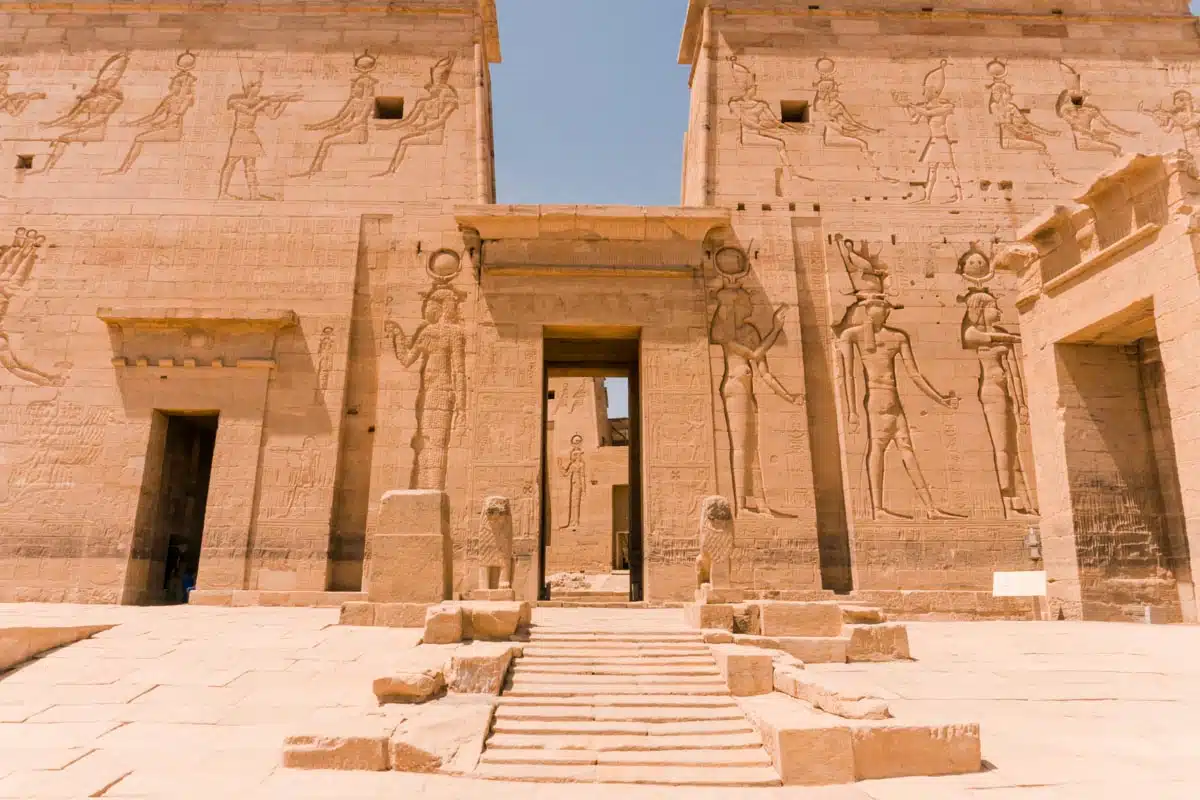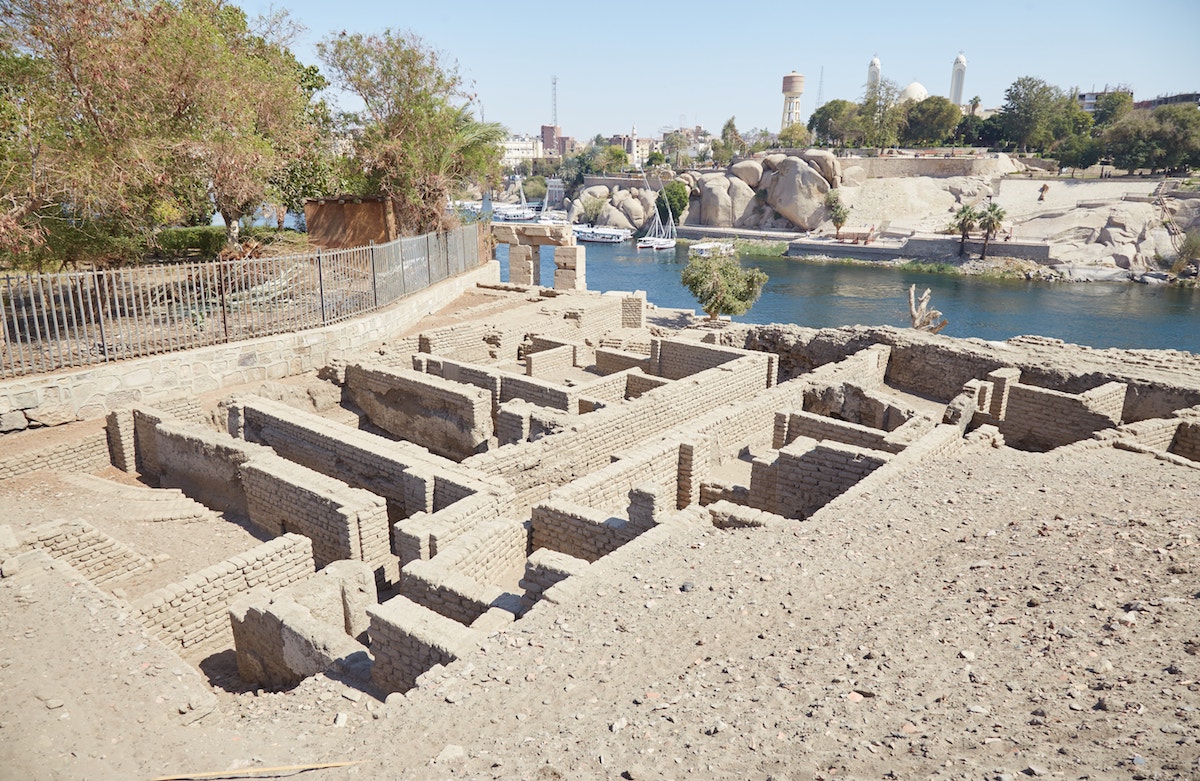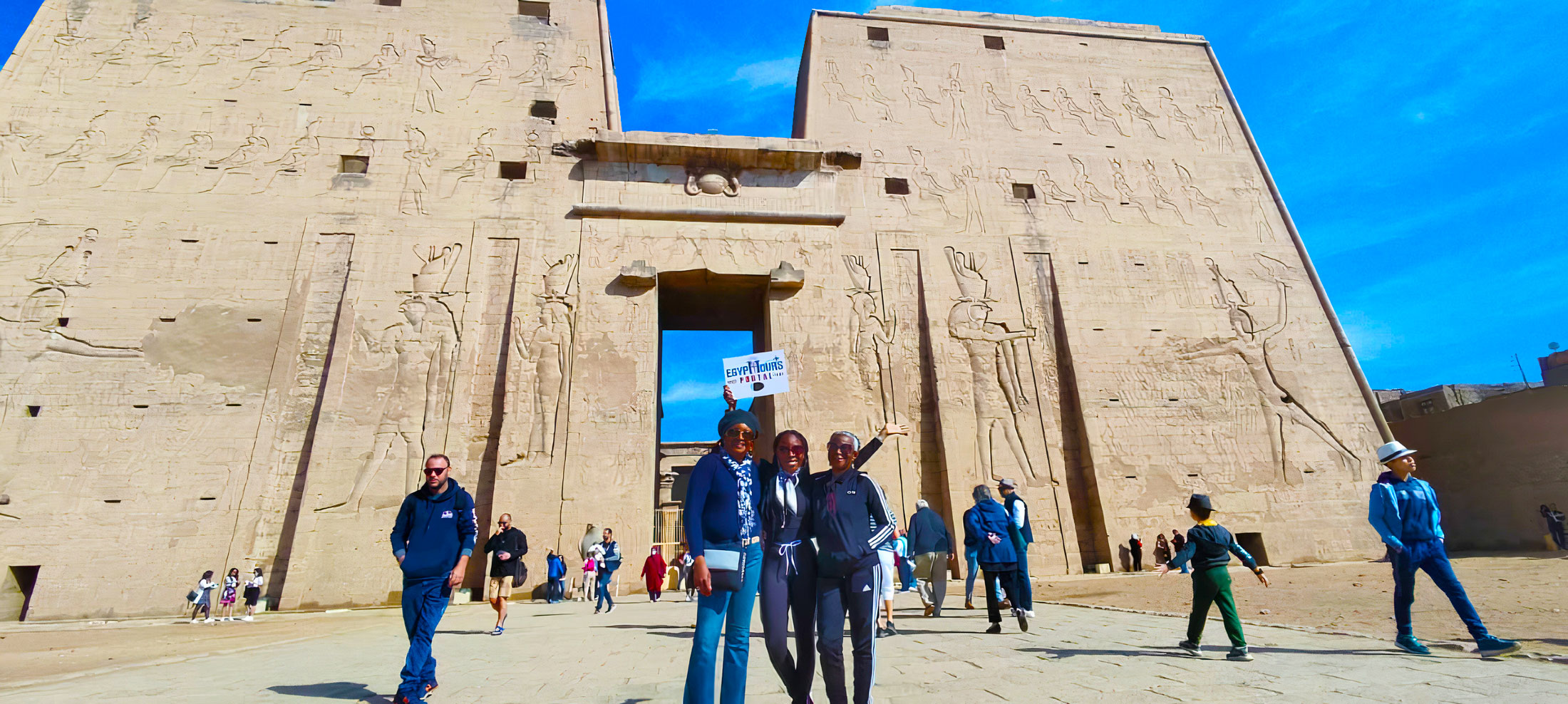Aswan Tours: Your Guide to the Ancient City

Welcome to Aswan, a fascinating city located on the banks of the Nile River in southern Egypt. Aswan is known for its rich history, stunning landscapes, and magnificent ancient monuments. Whether you are an avid history enthusiast or a curious traveller, visiting Aswan is a must to witness the wonders of ancient Egypt. In this blog section, we will explore the significance of Aswan in ancient Egypt and the benefits of taking a tour of this captivating city.
Overview of Aswan and its significance in ancient Egypt
Aswan is significant in ancient Egyptian history and was considered a gateway to Africa. It served as a strategic location for trade routes and military expeditions, making it a prosperous city during ancient times. Aswan was also a major centre for worshipping the goddess Isis and was revered for its temples dedicated to various gods and goddesses.
One of the most iconic sites in Aswan is the Philae Temple, dedicated to the goddess Isis. It was relocated to Agilkia Island after the construction of the Aswan High Dam to save it from being submerged in the Nile. Another remarkable attraction is the Unfinished Obelisk, which provides insight into the ancient Egyptian stone quarrying techniques.
Benefits of taking a tour in Aswan
Taking a tour of Aswan offers numerous benefits that enhance your overall experience in the city. Some of the key advantages include:
-
Expert Guidance: Professional tour guides provide in-depth knowledge about the history, significance, and stories behind the ancient sites in Aswan, ensuring a more meaningful and educational experience.
-
Time Efficiency: By opting for a guided tour, you can save time and visit multiple attractions in a well-planned itinerary. It eliminates the hassle of navigating unfamiliar streets and lets you maximise your time in Aswan.
-
Local Insight: Tour guides have extensive knowledge about Aswan's culture, traditions, and hidden gems. They can offer valuable recommendations for authentic dining experiences, vibrant markets, and lesser-known attractions.
-
Convenience and Safety: Organized tours provide transportation to and from the attractions, ensuring a hassle-free and safe journey. You can relax and enjoy the sights without worrying about logistics or transportation arrangements.
-
Group Dynamics: Joining a tour allows you to connect with like-minded travellers. It offers opportunities for cultural exchange, new friendships, and shared experiences that enrich your journey in Aswan.
Taking a tour of Aswan ensures a comprehensive exploration of the city's historical sites, enabling you to immerse yourself in the ancient Egyptian civilization.
Aswan is a city steeped in ancient history and offers a remarkable journey back in time. By taking a tour in Aswan, you can delve deeper into the mysteries of ancient Egypt, gain valuable insights from knowledgeable guides, and create memories that will last a lifetime. So, pack your bags, embark on an adventure, and let Aswan captivate you with its timeless charm.

Must-Visit Attractions
In Aswan, Egypt, several incredible attractions showcase the city's rich history and cultural heritage. Whether you're a history enthusiast or simply looking to explore a unique destination, Aswan has something to offer everyone. Here are a few must-visit attractions in Aswan that you should add to your itinerary.
Philae Temple and its historical importance
Philae Temple: Located on the island of Philae, this ancient temple complex is a must-see attraction in Aswan. Dedicated to the goddess Isis, the temple was built during the Ptolemaic period and is renowned for its impressive architecture and carvings. Due to the construction of the Aswan High Dam, the temple was relocated to its current location on Agilkia Island, ensuring its preservation for future generations to admire.
The Unfinished Obelisk and the ancient quarry
The Unfinished Obelisk: Situated in the ancient granite quarries of Aswan, the Unfinished Obelisk is a fascinating site to explore. Carved from a single piece of granite, this obelisk is believed to be commissioned by Queen Hatshepsut, but it was left unfinished due to a crack. Visitors can learn about the ancient quarrying techniques and gain insights into the monumental task of carving obelisks during ancient times.
Aswan High Dam and its impact on the region
Aswan High Dam: Considered one of the modern wonders of engineering, the Aswan High Dam is a massive structure built across the Nile River. Completed in the 1970s, the dam has significantly impacted the region by controlling floodwaters, generating hydroelectric power, and providing irrigation water for agricultural purposes. Visitors can witness the impressive scale of the dam and learn about the benefits and challenges it has brought to the area.
Here's a summary table of the attractions:
| Attraction | Philae Temple | The Unfinished Obelisk | Aswan High Dam |
|---|---|---|---|
| Historical Significance | Dedicated to the goddess Isis and relocated due to the Aswan High Dam | Carved from a single piece of granite and left unfinished | Control floodwaters, generate hydroelectric power, and provide irrigation water |
| Location | Agilkia Island | Ancient granite quarries of Aswan | Across the Nile River |
| Architectural Features | Impressive architecture and carvings | Monumental task of ancient obelisk carving | Masterpiece of engineering |
These attractions give visitors a glimpse into Aswan's ancient past and modern engineering marvel. Aswan's historical sites, such as Philae Temple and the Unfinished Obelisk, offer insights into the ancient Egyptian civilization, while the Aswan High Dam represents the city's modern development. Don't miss the chance to explore these remarkable attractions and immerse yourself in Aswan's captivating history.

River Nile Experience
In the beautiful city of Aswan, Egypt, some several activities and attractions offer a unique and unforgettable experience along the River Nile. From relaxing boat rides to immersing yourself in the local culture, Aswan has something for everyone. Here are two must-try experiences during your visit to Aswan:
Felucca boat ride on the Nile River
One of the highlights of visiting Aswan is taking a felucca boat ride on the Nile River. Feluccas are traditional sailboats commonly used for transportation and leisure activities. These wooden sailboats offer a peaceful and serene journey along the Nile, allowing you to enjoy the breathtaking views of the riverbanks and the surrounding landscapes. Whether you choose a short ride or a longer cruise, the felucca experience provides an opportunity to unwind and take in the natural beauty of Aswan. You can even join a guided tour, where you'll learn about the history and significance of the Nile River while sailing on these traditional boats.
Nubian Village visit and cultural immersion
Another fascinating experience in Aswan is visiting the Nubian Village, located on the east bank of the Nile. The Nubian people have a rich cultural heritage that dates back thousands of years, and visiting their village offers a glimpse into their unique way of life. You can take a guided tour through the village, where you'll have the opportunity to interact with the friendly locals, try traditional Nubian cuisine, and learn about their customs and traditions. The vibrant and colourful houses in the village add to the charm of the experience, making it a photographer's paradise. It's a chance to immerse yourself in a different culture and better understand the Nubian community.
Here's a table to give you an overview of these experiences:
| Experience | Felucca Boat Ride | Nubian Village Visit |
|---|---|---|
| Location | Nile River | East bank of the Nile |
| Description | Peaceful and serene boat ride on a traditional sailboat | Visit a Nubian village and learn about their culture |
| Highlights | Breathtaking Nile River views | Interact with the friendly locals and try traditional Nubian cuisine |
| Tour Options | Short rides or longer cruises | Guided tours through the village |
| Photography | Scenic landscapes and the riverbanks | Vibrant and colorful houses |
These experiences truly showcase the beauty and cultural richness of Aswan. Whether you sail the Nile on a felucca or immerse yourself in the Nubian way of life, both activities promise a memorable and authentic Egyptian experience. Don't forget to bring your camera to capture the stunning moments and enjoy every minute of your Aswan adventure!

Temples and Tombs
Regarding ancient cities, Aswan stands out as a must-visit destination. This historical city in Egypt is known for its rich cultural heritage and ancient ruins. For travellers fascinated by history and architecture, Aswan offers a plethora of temples and tombs that showcase the grandeur of ancient Egypt. Here is a guide to two must-visit sites in Aswan: the Abu Simbel Temples and the Kom Ombo Temple.
Abu Simbel Temples and their impressive architecture
The Abu Simbel Temples: are truly a marvel to behold. Built during the reign of Pharaoh Ramses II, these temples are considered one of Egypt's most significant archaeological sites. They were constructed to commemorate Ramses II's victory at the Battle of Kadesh and to honour the gods Amun, Ra-Horakhty, and Ptah. The most striking feature of the temples is the four colossal statues of Ramses II that adorn the façade. These statues, each standing at a height of 20 meters, showcase the incredible craftsmanship of ancient Egyptian artisans. The interior of the temples is equally impressive, with intricate carvings depicting scenes from ancient mythology and historical events.
Kom Ombo Temple and its unique dual design
The Kom Ombo Temple: is another fascinating site in Aswan. What sets this temple apart is its unique dual design. Built during the Ptolemaic period, the Kom Ombo Temple is dedicated to two gods - Sobek, the crocodile-headed god, and Horus, the falcon-headed god. The temple is divided into two identical sections, each dedicated to one of the gods. The design allows visitors to explore the temple and witness the worship of both gods simultaneously. The temple walls are adorned with reliefs and inscriptions that provide insight into ancient Egyptian beliefs and rituals. The temple also houses a museum that displays artefacts discovered in the surrounding area, offering further insight into the history of Aswan.
Here's a table to compare the two sites:
| Site | Abu Simbel Temples | Kom Ombo Temple |
|---|---|---|
| Importance | Significant Archaeological Site | Historical and Architectural Importance |
| Built By | Pharaoh Ramses II | Ptolemaic Period |
| Main Deity | Amun, Ra-Horakhty, and Ptah | Sobek and Horus |
| Main Features | Colossal statues of Ramses II | Dual design dedicated to two gods |
| Architectural Style | Ancient Egyptian | Ptolemaic |
Aswan's temples and tombs are a testament to ancient Egypt's rich history and grandeur. Each site offers a unique experience and insight into the lives of the pharaohs and the religious practices of the time. Whether you're a history enthusiast or simply curious about the wonders of the ancient world, a visit to Aswan is sure to leave you in awe.

Elephantine Island
Aswan is a city in southern Egypt rich in history and ancient treasures. One of the must-visit destinations in Aswan is Elephantine Island, an island in the Nile River. This island holds significant historical and archaeological sites that glimpse the city's past.
Exploration on Elephantine Island: When visiting Elephantine Island, you can explore various ancient sites. One of the most notable is the Temple of Khnum, dedicated to the ram-headed god Khnum, the creator of the Nile's floodwaters. This temple dates back to the Middle Kingdom and has well-preserved ruins that provide insights into ancient Egyptian religious practices.
Another fascinating site on Elephantine Island is the Nilometer, a structure used to measure the Nile's water levels. This tool was important to the Egyptians, as it helped them predict and manage the farming seasons and flood cycles. Exploring the Nilometer and learning about its significance offers a unique perspective on the ancient Egyptian civilization's connection to the Nile River.
Aswan Museum and its collection of artefacts
The Aswan Museum: To delve deeper into Aswan's ancient history, visiting the Aswan Museum is a must. The museum houses a remarkable collection of artefacts and exhibits that showcase the city's rich and diverse heritage.
Inside the museum, you will find artefacts from various archaeological sites in Aswan and the surrounding areas. The collection includes statues, reliefs, jewellery, and pottery from different eras, including the Prehistoric, Pharaonic, and Greco-Roman periods. These artefacts provide a fascinating glimpse into the lives and traditions of the ancient Egyptians who lived in Aswan.
One of the museum's highlights is the collection of artefacts from the Nubian civilization, which flourished in the region. These artefacts offer insights into the rich cultural exchange between the ancient Egyptians and the Nubians.
To fully appreciate the significance of the artefacts, the museum provides informational displays and detailed descriptions. These resources help visitors understand each item's historical and cultural context, making the visit a truly immersive experience.
Exploring Elephantine Island and visiting the Aswan Museum is essential for anyone seeking to understand the ancient history of this fascinating city. Whether you are a history enthusiast, an archaeology lover, or simply curious about the past, Aswan offers incredible opportunities to discover the wonders of the ancient world.

Local Culture and Cuisine
Aswan is known for its rich history and ancient landmarks, vibrant local culture, and delicious cuisine. When visiting this enchanting city, it's essential to immerse yourself in the local experiences and indulge in the traditional flavours. Here is your guide to exploring the local culture and cuisine in Aswan.
Exploring the local markets and bazaars in Aswan
One of the best ways to experience the local culture in Aswan is by wandering through the bustling markets and bazaars. The city is famous for its vibrant markets, where you can find various traditional crafts, spices, textiles, and souvenirs. The Aswan Souk is a must-visit destination, offering a treasure trove of unique items and local products. Don't forget to practice your bargaining skills and negotiate prices with friendly local vendors.
Sampling traditional Nubian cuisine
A trip to Aswan would not be complete without indulging in the mouthwatering traditional Nubian cuisine. Nubian food is known for its bold flavours, diverse ingredients, and delightful combinations. Make sure to try dishes such as Ful Medames (slow-cooked fava beans), Koshari (a mix of lentils, rice, and pasta topped with tomato sauce and crispy onions), and Meshabek (grilled fish marinated in local spices). For a unique dining experience, head to one of the local Nubian restaurants and enjoy the warm hospitality and authentic flavours.
Here's a list of some popular traditional Nubian dishes:
- Ful Medames: Slow-cooked fava beans seasoned with garlic, lemon juice, and olive oil.
- Koshari: A mixture of lentils, rice, and pasta topped with tomato sauce and crispy fried onions.
- Meshabek: Grilled fish marinated in a blend of aromatic spices.
- Molokhia: A nutritious green soup made from molokhia leaves, garlic, coriander, and chicken or meat.
- Ta'ameya: Like falafel, these fried balls are made from crushed fava beans, herbs, and spices.
Indulging in the local cuisine and exploring the markets are just a few ways to experience the vibrant culture of Aswan. Whether you're a food lover or an avid shopper, the city offers many experiences that will leave you with lasting memories of your trip. So, don't miss the opportunity to immerse yourself in the local culture while visiting this ancient city.

Nearby Excursions
When visiting Aswan, Egypt, plenty of nearby excursions offer a deeper exploration of the country's rich ancient history. Two popular day trips from Aswan are Luxor and the Valley of the Kings and the temples of Edfu and Dendera.
Day trips to Luxor and the Valley of the Kings
Luxor and the Valley of the Kings: Located approximately 170 miles north of Aswan, Luxor is often called the world's greatest open-air museum. It is home to numerous ancient Egyptian artefacts, temples, and royal tombs. One of the main attractions in Luxor is the Valley of the Kings, where pharaohs were buried in elaborately decorated tombs. Visitors can explore the tombs of famous rulers, such as Tutankhamun and Ramses II, marvelling at the intricate hieroglyphics and paintings that adorn the walls. Visiting Luxor and the Valley of the Kings offers a captivating glimpse into ancient Egyptian civilization.
Exploring the temples of Edfu and Dendera
The temples of Edfu and Dendera: Edfu is dedicated to the falcon-headed god Horus and is one of the best-preserved ancient Egyptian temples. Its grandeur and architectural beauty make it a must-visit site. Visitors can marvel at the massive entrance pylons, intricate wall carvings, and the hypostyle hall. The temple of Dendera, dedicated to the goddess Hathor, is another remarkable ancient site. It showcases well-preserved carvings, colourful ceilings, and a stunning zodiac depiction on its ceiling. Exploring these temples offers a captivating glimpse into ancient Egyptians' religious practices and beliefs.
Here's a table to summarize the key features of these excursions:
| Excursion | Luxor and the Valley of the Kings | Temples of Edfu and Dendera |
|---|---|---|
| Distance from Aswan | Approximately 170 miles north | Approximately 60 miles north |
| Main Attractions | Valley of the Kings, ancient temples, ancient artefacts | Temple of Edfu, Temple of Dendera, well-preserved carvings |
| Historical Significance | Burial site of pharaohs, insight into ancient royal practices | Worship sites for gods, representation of religious beliefs |
| Notable Features | Intricate hieroglyphics, elaborate tomb decorations, open-air museum | Massive entrance pylons, hypostyle hall, stunning ceiling carvings |
Visiting these nearby excursions from Aswan allows travellers to delve deeper into Egypt's fascinating ancient civilization. Each destination offers its unique historical significance and awe-inspiring features. Whether you explore the Valley of the Kings or the temples of Edfu and Dendera, you will surely be captivated by the wonders of ancient Egypt.
